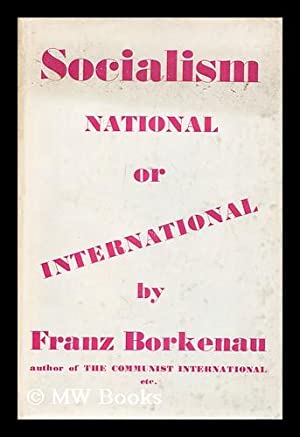
Socialism National or International by Franz Borkenau PDF
9.5466 MB·other
Most books are stored in the elastic cloud where traffic is expensive. For this reason, we have a limit on daily download.
Preview Socialism National or International by Franz Borkenau
Description:
Published in London during WWII.
During World War II, Borkenau lived in London, and worked as a writer for Cyril Connolly's journal Horizon. In 1940, Borkenau was interned by the British government as an "enemy alien" and deported to an internment camp in Australia.[2] In 1941, he was released and returned to London, where he worked as a lecturer at London University until April 1943.[31] In 1942, he published a book Socialism—National or International?, where he took up the question of what the world should be like after the hoped-for Allied victory.[32] Borkenau concluded that the wartime expansion of the powers of the state would mean some sort of socialism was the solution to the world's problems, writing that "a planned economy, if once established, should never abolish individual means of ownership".[32] He argued that reconstruction of the world economy was not compatible "with a programme of class struggle", leading him to write that the best party to lead Britain after the war ended was the Labour Party.[32] Borkenau rejected Communism, and instead urged an alliance of the Labour Party with the left wing of the Democratic Party in the United States.[32] For Britain, Borkenau urged a gradualist transition from capitalism to socialism, writing that "precisely through the gradual growth of state intervention" as preached by the Labour Party was the best way forward.[32] Borkenau condemned Communism, writing: "How dare I soil the name of socialism by associating it with a dirty piece of trickery such as Soviet Russia?"[32] Borkenau wrote that Communist internationalism was only a vehicle for Soviet imperialism, while "Labour internationalism would be embodied in mutual help".[33] In April 1943, he left London University to start work as speaker of the BBC's German language broadcasts, delivering anti-Nazi speeches that appealed to the German people to overthrow the Nazi regime.[31] In 1944, he started to work for the United States Office of War Information as an expert on Germany and Austria.[31]
During World War II, Borkenau lived in London, and worked as a writer for Cyril Connolly's journal Horizon. In 1940, Borkenau was interned by the British government as an "enemy alien" and deported to an internment camp in Australia.[2] In 1941, he was released and returned to London, where he worked as a lecturer at London University until April 1943.[31] In 1942, he published a book Socialism—National or International?, where he took up the question of what the world should be like after the hoped-for Allied victory.[32] Borkenau concluded that the wartime expansion of the powers of the state would mean some sort of socialism was the solution to the world's problems, writing that "a planned economy, if once established, should never abolish individual means of ownership".[32] He argued that reconstruction of the world economy was not compatible "with a programme of class struggle", leading him to write that the best party to lead Britain after the war ended was the Labour Party.[32] Borkenau rejected Communism, and instead urged an alliance of the Labour Party with the left wing of the Democratic Party in the United States.[32] For Britain, Borkenau urged a gradualist transition from capitalism to socialism, writing that "precisely through the gradual growth of state intervention" as preached by the Labour Party was the best way forward.[32] Borkenau condemned Communism, writing: "How dare I soil the name of socialism by associating it with a dirty piece of trickery such as Soviet Russia?"[32] Borkenau wrote that Communist internationalism was only a vehicle for Soviet imperialism, while "Labour internationalism would be embodied in mutual help".[33] In April 1943, he left London University to start work as speaker of the BBC's German language broadcasts, delivering anti-Nazi speeches that appealed to the German people to overthrow the Nazi regime.[31] In 1944, he started to work for the United States Office of War Information as an expert on Germany and Austria.[31]
See more
The list of books you might like
Most books are stored in the elastic cloud where traffic is expensive. For this reason, we have a limit on daily download.
